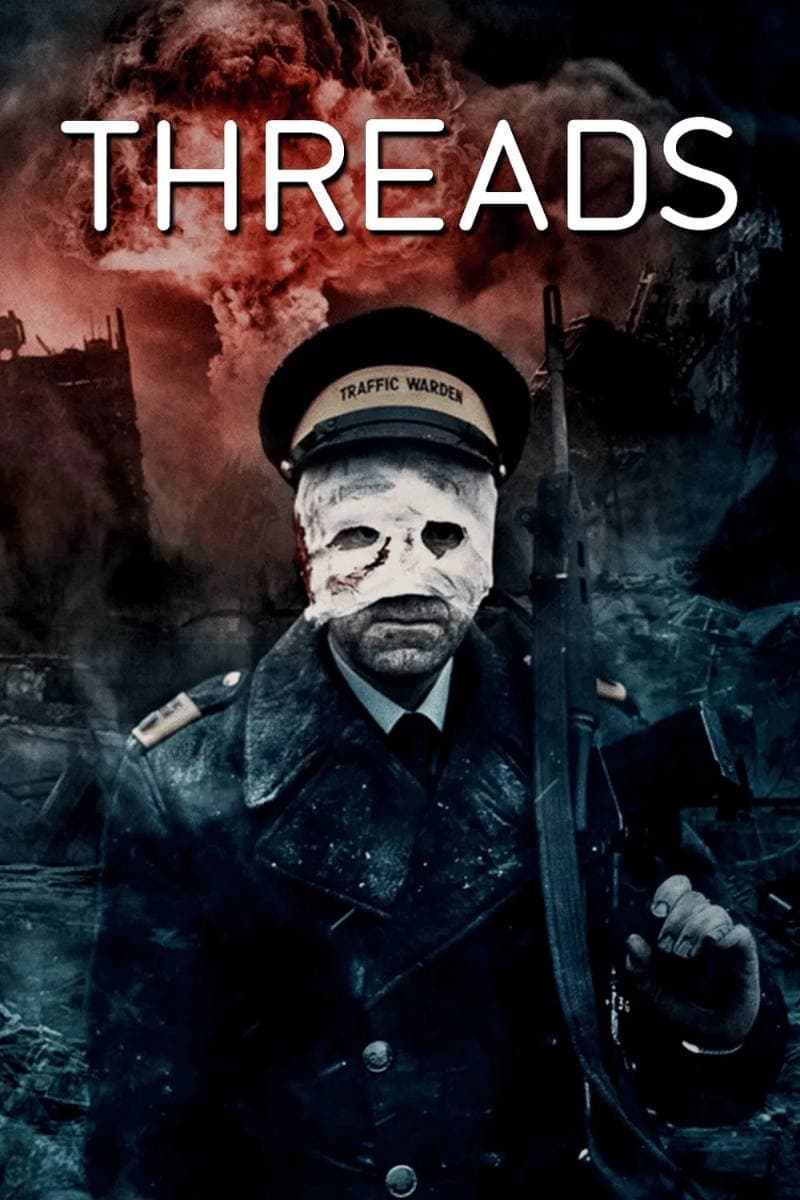Threads (1984)

Possibly one of the grimmest, bleakest, most disturbing, most distressing films I've ever watched. Threads was a BBC made-for-TV film, first broadcast in September, and shown very infrequently ever since. I happened to catch it during one of its rare repeats in July 2025 - apparently only its fifth showing on the BBC since 1984.
The film is a hypothetical vision of what might happen if nuclear war broke out. Its primary backdrop is Sheffield in 1984, where we are introduced to Jimmy and Ruth, a young couple who are planning to get married after Ruth falls pregnant. Jimmy lives in a working class household with his parents and younger brother and sister. Ruth's upbringing is a little more middle class. Life seems fairly normal and routine. All the while, trouble is brewing - as per usual - in the Middle East. Although TV bulletins and newspaper headlines describe the increasing tensions in Iran, it's initially just background noise as people go about their day-to-day business - shopping, working, playing video games, drinking at the pub.
The situation escalates rapidly in Iran as Soviet and US forces trade hostilities. NATO nations, including the UK, lend their support to the USA, while members of the Warsaw Pact do the same to the Soviet Union. Remember, at the time, Germany was still a divided nation, with Berlin also split between east and west. We weren't that far away from hot spots of danger.
With a growing sense of imminent danger, panic buying starts, followed by fuel shortages, restrictions on movement, instructions on how to create bunkers and avoid exposure to nuclear fallout. Local council leaders are instructed to move to underground bases to provide local government in case of the loss of central government.
And then, kaboom. The bombs go off, Woolworths and BHS explode, and the initial explosions destroy almost everything in its radius. Jimmy appears to perish. His family - and Ruth's - survive. Though survival, in this case, might be the crueller fate. It's the aftermath where things get even bleaker. Britain enters into a nuclear winter. And everything just feels hopeless. It seems that, no matter what measures a government may have put in place to deal with a nuclear attack, it would just be futile. No electricity, no running water, very little food, very little fuel, the almost total inability to grow crops - it all leads to a situation of surviving just for the sake of surviving.
We follow Ruth through much of the second half of the film, as she goes from one hopeless situation to another. She gives birth to a daughter, and spends Christmas Day 1984 in silence around a fire in a shed with a group of strangers. I can't help but think about what they would have been thinking about around that fire. Probably about the previous Christmas, and how they spent it with smiling family and friends, tinsel and turkey. Even when we fast forward ten years, and then a further three, little progress has been made. People live an almost medieval existence, education appears to be provided through old video tapes of Words and Pictures. The film ends with another birth. A sign of hope? Apparently not.
And that's the thing with Threads. It truly shows that there is no winner in a nuclear war. It highlights how, in their quest to wave around their power and might, and in the absence of diplomacy, leaders can reduce civilisation to ash in minutes. What is the point making the world think you're the greatest leader, if there is no world left afterwards?
The film is presented in a sort of documentary style. A voiceover highlights the situation in the matter-of-fact way that 1980s educational documentaries did. It's kind of comforting in that it sounds so normal, but kind of disconcerting too. Text also appears on screen, again in a 1980s-style (words type onto the screen, rather than appear at once), with factual or statistical information. And sometimes, rather than visuals showing what is happening, we see stills and photographs. It has a very unsettling effect.
This is probably what makes the film so brilliant. It's in its realism. In addition to the presentation style, which was very contemporary at the time it was made, it's how life in general is depicted. I was around in 1984, and although I was young, the country did feel very much like how it was portrayed in the film. My comment about BHS and Woolworths exploding wasn't a flippant remark. What we see in the film is the destruction of a very real, very familiar world, with very real and very familiar people dying and suffering in it. Maybe the fact it was a BBC TV production with a much lower budget than a Hollywood movie is what caused it to feel so real. It was produced in a way that felt so familiar.
What it does even more is show it in disturbing and graphic detail. It's grim, it's horrific. It doesn't hold back. It isn't all about gore, it's moments like Ruth's grandmother being embarrassed by the fact she soiled herself in shock or fear when the bombs went off. It's Ruth eating raw sheep (apparently that was real too). It's the slow suffocation of the council staff in a basement while they're trying to control a situation that simply can't be controlled. It's the coughing, the spluttering, the vomiting - basically the effects that fallout has on the human body.
Threads really is an amazing film. I'll never watch it again. But everyone should, just the once. It might be the most important film you'll never want to revisit.